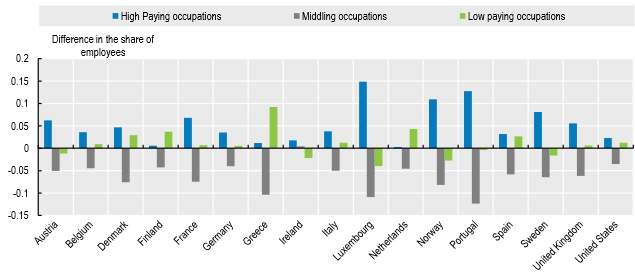International trade has led to an equally global backlash from citizens of advanced economies against the economic deprivation to which they feel exposed, John Egan writes.
The Organisation for Economic Co-operation and Development (OECD) today has responded with a call for a new commitment to a common set of transparent principles for a mutually beneficial global economy.
In its 168-page Business and Finance Outlook 2017, the OECD recommends a root and branch overhaul of policies governing competition, trade and international investment in the world economy.
To solve a problem, the first step is to recognise the problem.
Collusion through cross-border cartels is raising prices for consumers and in particular low-income families: 240 cartels were detected and fined between 1990 and 2015, affecting $7.5 trillion in sales
Twenty years ago the globalisation of trade was seen as a panacea through which millions of people could escape a life of poverty without long-term dislocation – with each country doing what it is best at and gradually moving up the value added chain. As the theory goes emerging economies urbanise and generate savings for investment and productivity, rising real wages create increased demand. Real exchange rates then appreciate over time, encouraging a growing demand for foreign goods. As the urbanisation process matures, productivity should continue to rise through technology transfer between rich and poor countries.
It was understood that lower skilled workers would inevitably become less valued in the advancing economies, but labour mobility through regions and sectors was expected to bring about the necessary adjustments.
Wage inequalities in advanced economies were explained by skill-based supply and demand. The effects of trade and immigration were assumed to be small. Immigration, while providing overall benefits to an economy, may have minor adverse effects on some segments of a national population, but competition would then even-out skill differentials.
This automatic conveyor belt moving economies towards ever-increasing prosperity has recently shown itself to malfunction.

Differences in share of employment between 2000 and 2015 by pay category (Percentage points).
Source: OECD Business and Finance Outlook 2017 (Figure 2.5). Eurostat, US Bureau of Labour Statistics, OECD calculations.
The hope that less-skilled workers would be sufficiently mobile to move between regions and industries to maintain or even improve their living standards is contradicted by the OECD evidence, as indicated in the figure above.
In many advanced countries, the share of middle-paying jobs fell between 2000 and 2015. Employment growth has been strongest in the highest paying, more technologically demanding jobs. The employment of less-skilled workers in advanced countries would be expected to decline without significant wage falls, as unskilled labour is abundant in less developed countries. The capital abundance in advanced economies, together with the relentless rise of automation displacing middle income occupations, may also have played a related role.
The OECD calls for greater fairness in cross-border interactions and the reinforcement of policies to help workers affected by globalisation and technological change
The expansion of global trade and investment, with related impacts of new technology and innovation, can have negative repercussions that have been felt in many advanced economies.
“The backlash against globalisation has grown in many countries and too little has been done to help more people cope with the inter-related impact of trade, foreign direct investment and technological change,” OECD Secretary-General Angel Gurría said today.
“In addition to developing more effective domestic policies, it has become essential for all nations to work together to ensure a level playing field in trade, investment and corporate behaviour to better address the downsides of globalisation while preserving the benefits of economic openness. This will ensure that the growth it fosters is inclusive and sustainable, and that globalisation works for all.”
The OECD calls for greater fairness in cross-border interactions and the reinforcement of policies to help workers affected by globalisation and technological change. These should include increased infrastructure investment, structural reforms, safety nets, worker retraining and education, and “kick-start adjustment” support for trade-exposed workers.
The report also addresses other areas where action is needed. These include:
- The impact of state-owned enterprises: these companies grew from 9.8 per cent of the Fortune global 500, to close to 23 per cent in recent years. Importantly, they include large financial companies which can play a key role in funding other SOEs on favourable terms across most business sectors. In light of their growing importance, it is critical that SOE governance and ownership respect best practices and prevent government support or subsidies that distort competition.
- Collusion through cross-border cartels is raising prices for consumers and in particular low-income families: 240 cartels were detected and fined between 1990 and 2015, affecting $7.5 trillion in sales. Countries need to enforce rules around bid rigging and reduce barriers to collecting information and sharing investigations between authorities in different countries.
- Stricter enforcement of bribery and corruption laws is needed to improve the face of globalisation in the world economy. Rent-seeking behaviour is estimated to be 2 to 3 per cent of world GDP, equivalent to the size of the French economy.
- Competition in equity finance markets needs to be strengthened. The 2017 Outlook notes that in the case of equity initial public offerings (IPOs) of less than $100 million, the typical fee for underwriting is 9 to 11 per cent of the transaction. This increases the cost of equity and works against long-term productive investment.
The survival of international trade against a widespread backlash of nationalism and protectionism requires a commitment by countries participating in globalised markets to a common set of transparent principles that are consistent with mutually beneficial competition, trade and international investment, the Business and Finance Outlook 2017 concludes.
It is a direction of travel likely to evoke considerable resistance in groups involved in resurgent nationalism and will require political courage in significant measure.
Nevertheless, the prize of a fairer and more prosperous world could hardly be more compelling.
Follow on twitter: @johnmegan





